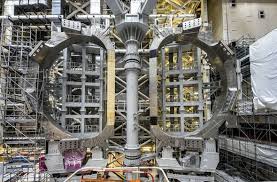As part of the country’s shift to sustainable energy, the Biden administration intends to establish a commercial nuclear fusion reactor within ten years, according to U.S. Energy Secretary Jennifer Granholm on Monday.
President Joe Biden wants to use nuclear fusion as a carbon-free energy source to power homes and businesses, according to Granholm, who called it a cutting-edge technology.
In an extensive interview with reporters in Vienna, Granholm stated that the likelihood of the United States achieving Biden’s “decadal vision of commercial fusion” was “not out of the question.”
By exerting such pressure on neighboring hydrogen atoms that they smash together to form helium, fusion generates vast quantities of heat and energy. It doesn’t produce radioactive waste, in contrast to other nuclear reactions. Nuclear fusion proponents believe that it may eventually replace fossil fuels and other conventional energy sources. Fusion energy production, however, is still decades away from providing homes and businesses with carbon-free energy.
Researchers at the Lawrence Livermore National Laboratory in California made a significant advancement last December when they successfully fused nuclear fuel for the first time.
Granholm also complimented the U.N. nuclear watchdog’s function in ensuring that states uphold their obligations under international agreements and do not utilize their nuclear programs for nefarious ends, such as the production of nuclear weapons.
She claimed that the IAEA was crucial in ensuring that nuclear energy was used for good purposes and did not end up in the hands of criminals.
More than 170 states have signed agreements allowing the watchdog organization to inspect their nuclear programs. The objective is to confirm that their nuclear operations and materials are used for peaceful reasons, including the production of energy.
The Biden administration’s objective to have a carbon-pollution-free power sector by 2035 and a net-zero emissions economy by 2050 depends heavily on nuclear energy.
Granholm responded that the U.S. has started a process to discover communities around the nation that may be willing to host an interim storage place when asked about the challenge of locating storage sites for radioactive waste. The majority of the spent fuel is being kept in nuclear reactors all around the nation.
We have picked 12 organizations that will speak with local governments nationwide to determine their interest in hosting an interim portal, she said.
The United States does not recycle spent nuclear fuel, but other nations, including France, have done so in the past.
It is possible to recycle used nuclear fuel so that new fuel is produced. However, detractors of the method claim that it is inefficient and might encourage the spread of atomic bombs.
According to the Washington-based Arms Control Association, recycling raises two issues about proliferation: Since plutonium gets separated during the recycling process, there is an increased chance that terrorists will steal it and use it to build their own nuclear bombs.
With all these anti-proliferation protections in place, it must be done with extreme caution, according to Granholm.
The United States has advanced fusion research and designs by a variety of firms aiming towards a pilot-scale demonstration within a decade, according to Professor Dennis Whyte, director of the Plasma Science and Fusion Centre at the Massachusetts Institute of Technology.
He referred to the Energy Department’s milestone-based fusion development program, saying, “It doesn’t guarantee a specific company will get there, but we have multiple shots on goal.” “It’s the right way to do it, to support what we all want to see: commercial fusions power our society” without emitting greenhouse gases.
Regarding other matters, Granholm stated that the Biden administration might reveal in October specifics regarding an $8 billion hydrogen hub program that will be financed by the bipartisan infrastructure plan depending on whether or not the US government shuts down.
A hub is intended to be a network of businesses that generate clean hydrogen, along with the sectors of industry that use it, like heavy transportation, and supporting infrastructure, such as pipelines and refueling facilities. States and businesses have joined forces to develop hub proposals.
Environmental organizations claim that hydrogen poses its own hazards for pollution and the climate. It increases the amount of methane and other glasshouse gases in the environment when it is discharged.
In a decade, Granholm insisted, “Our goal is to get the cost of clean hydrogen down to $1 per kilogram.”
Granholm was questioned on the U.K. Prime Minister Rishi Sunak’s announcement that the U.K. will defer important climate targets as fossil fuel emissions continue to warm Earth’s atmosphere and extreme weather events occur everywhere.
As part of one of his greatest policy adjustments since assuming office, Sunak stated last week that he will postpone the deadline for the sale of new gasoline and diesel cars as well as the phase-out of gas boilers.
“I think it becomes obvious that we need to put on the accelerator,” she said, adding that the U.K. has been a “great partner” in advancing contemporary technologies. “When you see the heat waves that the U.K. experienced this summer, I think it becomes obvious that we need to put on the accelerator.”
The shift to renewable energy is something that everyone, including ourselves, wants to move towards as rapidly as possible, she said.
















